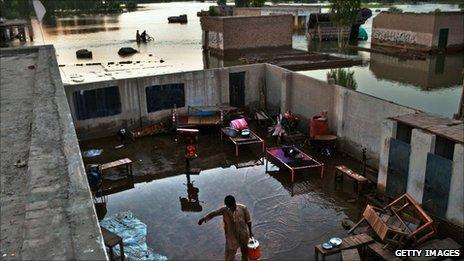IMF to review 'massive challenge' of flood-hit Pakistan
- Published

The International Monetary Fund says the floods that have struck Pakistan pose a "massive economic challenge" and it will review the country's budget and financial prospects.
The IMF will start talks with Pakistani officials in Washington on Monday to assess how best to give help.
Tens of thousands more Pakistanis have been fleeing the floods, with the south now bearing the brunt.
Overall, about 1,600 people have been killed and 20 million affected.
Masood Ahmed, director of the Middle East and Central Asia department of the IMF, said in a statement: "The floods which have hit Pakistan in recent weeks and brought suffering to millions of people will also pose a massive economic challenge to the people and government of Pakistan.
"The scale of the tragedy means that the country's budget and macroeconomic prospects, which are being supported by an IMF-financed programme, will also need to be reviewed."
Mr Ahmed said that the IMF stood by Pakistan "at this difficult time".
The IMF agreed a rescue package with Pakistan two years ago as the country was then weighed down by soaring inflation, shrinking reserves and fighting militancy.
The Pakistan government has said that the cost of rebuilding after the floods could be as high as $15bn (£10bn).
Trying to survive
The BBC's Mike Wooldridge in Islamabad says there are concerns about higher inflation and lower growth, along with higher food prices caused by disruption to supply routes.
He says the extensive damage to the agricultural industry as a whole is another heavy blow because this is such an important part of the economy.
Meanwhile, tens of thousands more Pakistanis are being displaced in the southern province of Sindh, which is now being described as the country's worst hit province.
The BBC's Jill McGivering, who has in Sukkur in Sindh, says families are visible everywhere - on riverbanks, open ground and along the roadside.
About one-tenth of the homeless have places in relief camps, the rest are trying to survive alone, without shelter or any assurance of food, she says. Aid is being provided but it is limited and in enormous demand.
Dozens more villages have been inundated and although authorities expect flood waters to drain into the Arabian Sea over the next few days, evacuees who return may find their homes and livelihoods have been washed away.
The UN says it has now raised about 70% of the $460m it called for in its emergency appeal, as donors pledged more money.
Pakistan has also accepted $5m (£3.2m) in aid from its rival and neighbour India.
The floods began last month in Pakistan's north-west after heavy monsoon rains and have since swept south, swamping thousands of towns and villages in Punjab and Sindh provinces.
The UN said on Friday that more helicopters were urgently needed to reach communities cut off by the water.
Experts warn of a second wave of deaths from water-borne diseases such as cholera unless flood victims have access to supplies of fresh drinking water.
If you would like to make a donation to help people affected by the floods in Pakistan, you can do so through the UK's Disasters Emergency Committee at www.dec.org.uk or by telephone on 0370 60 60 900.